
South African theologian Charles Villa-Vicencio, regarded as a global authority in the area of transitional justice, will explore Africa's role as victim and as its own worst enemy when he presents an Oct. 17 public lecture as part of the E.N. Thompson Forum on World Issues.
The lecture, "Violence, Religion, Financial Muscle and Liberation: Can Africa Heal Itself?" begins at 7 p.m. at the Lied Center for Performing Arts.
Villa-Vicencio says contemporary Africa has suffered as a result of colonial and neo-colonial violence. Africa also has hurt itself with several intrinsically viable states engulfed in a destructive synthesis of military aggression, economic chaos, cultural animosity and religious warfare. His talk will be based on his experience as the national research director of the South African Truth and Reconciliation Commission (SATRC). He will concentrate on the lessons learned from South Africa's transition from apartheid to a democratic regime in dealing not only with Africa but other parts of the world plagued with continuous conflict.
The lecture is also the keynote of this year's Pauley Symposium, an annual event sponsored by the UNL Department of History that gathers and features the best of current research in the field of history. It lecture series honors UNL alumnus Carroll R. Pauley, class of 1930. Pauley's son, Bruce Pauley, established the endowment that created the series as a way to honor his father, who had a lifelong passion for history.
"This is an extraordinary opportunity that should not be missed by the wider community -- the chance to hear from a leading theologian and one of the most important figures in helping South Africa's transition toward democracy through SATRC," said Bedross Der Matossian, assistant professor of history at UNL and a symposium organizer. "The UNL community is excited to be in the presence of such an eminent figure within the field on its campus."
Villa-Vicencio is a distinguished theologian and political scientist who has used his expertise to advise several countries dealing with the challenges of rebuilding their societies after periods of internal strife, including Peru and various African nations.
He divides his time between Washington, D.C., where he is a visiting conflict resolution professor and research fellow at Georgetown University, and Africa, including in his native South Africa.
Villa-Vicencio is also a senior research fellow in the Institute for Justice and Reconciliation, based in Cape Town, South Africa, having founded the Institute in 2000 and served as its executive director for eight years. The institute encourages cooperation between groups in South Africa and beyond that have been divided by social conflicts.
He is the author or editor of 18 books, including his most recent, "Walk with Us and Listen: Political Reconciliation in Africa."
This season's Thompson Forum lectures have been organized around the theme of religion, rights and politics. A variety of distinguished speakers have been assembled to discuss international religious freedom, the death penalty debate, human rights concerns, and the role of women in religion, among other issues.
To reserve free tickets, call the Lied Center at 402-472-4747 or 800-432-3231. Tickets may also be picked up in person or ordered by downloading a form from the forum's website, http://enthompson.unl.edu. All tickets are for general admission seating.
Forum lectures will be available live online at http://www.unl.edu as well as on Lincoln TimeWarner Cable Channel 21, UNL campus Channel 8 and UNL's KRNU radio (90.3 FM). Sign language interpreters will be available at each lecture for the deaf and hard of hearing.
The Thompson Forum is a preeminent lecture series and cooperative project of the philanthropic Cooper Foundation, the Lied Center and UNL. It was established in 1988 with the purpose of bringing a diversity of viewpoints on international and public policy issues to the University of Nebraska and the residents of the state to promote understanding and encourage debate.
— Jean Ortiz Jones, University Communications